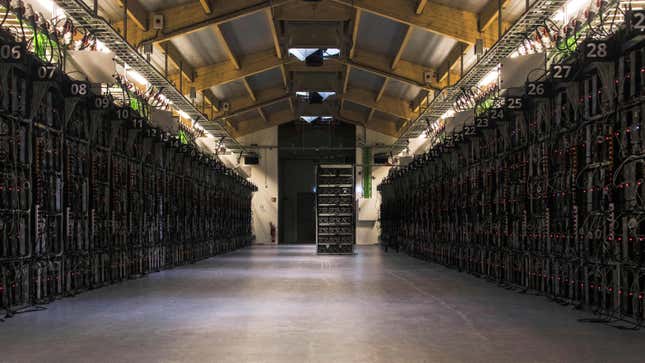
One of the European Union’s top regulators has a new proposal for reducing cryptocurrency’s carbon footprint: ban proof of work mining. The proposed prohibition, suggested by European Securities and Markets Authority Vice Chair Erik Thedéen during a Financial Times interview, would apply to EU nations and would come in tandem with a pivot to a less energy-intensive “proof of stake” mining method.
Thedéen said bitcoin—and cryptocurrencies in general—could imperil the EU’s chances at meeting its climate goal of reducing carbon pollution at least 55% by the end of this decade. Bitcoin and ether, the world’s two biggest cryptocurrencies, both rely on proof of work mining. The process is incredibly energy-intensive, pitting computers around the world in a race to solve a complex calculation. The first one that does mints a new block while the rest wasted energy—and emitted tons of carbon—for nothing.
A University of Cambridge report released last year estimated bitcoin mining worldwide consumed more electricity annually than all of Argentina. An analysis by Digiconomist, meanwhile, estimates bitcoin mining alone generates around 97 million tons of carbon annually, roughly the carbon footprint of Kuwait.
Some miners and marketplaces that use proof of work coins, particularly in the NFT space, have turned to carbon offsets. But that’s a false solution that doesn’t address the deeper issue of just lowering emissions. Proof of stake does just that, though. That system allows cryptocurrency owners to “stake” their cryptocurrency as collateral to become validators. Those validators create new blocks on a network and organize transactions. Because only one validator creates blocks at a time for proof of stake, the technique uses a tiny sliver of the energy of proof of work mining and results in lower carbon emissions.
“The financial industry and a lot of large institutions are now active in cryptocurrency markets,” Thedéen told the Financial Times. “We need to have a discussion about shifting the industry to a more efficient technology.”
Countries around the world have already started placing restrictions on cryptocurrency mining or banning the practice altogether. Chinese regulators issued a blanket ban on all cryptocurrency mining and transactions last year. Prior to the crackdown, 75% of cryptocurrency mining occurred in China. Counties that include Bangladesh, Algeria, and Egypt have all levied similar mining restrictions. Just this month, Kosovo became the most recent country to announce it would ban cryptocurrency mining. An EU ban would further constrain where miners operate, though there are still plenty of places willing to welcome them with open arms. That includes U.S. states (looking at you, Texas) and cities (cough, cough Miami) as well as other countries like El Salvador.
The EU makes up a relatively small share of proof of work mining compared to other countries like the U.S. Germany, France, Switzerland, and Italy, for example, combined make up less than 5% of worldwide bitcoin mining, according to the Cambridge Center for Alternative Finance. The U.S., by contrast, has a 35.4% share. At least for now, those figures would suggest the EU would have less to lose from banning proof of works than other nation-states.
While there are a number of laser-eyed members of Congress and states that want to keep the crypto good times rolling, the regulatory landscape could be shifting just a bit in the U.S. The House Energy Committee is set to hold a hearing this week, titled “Cleaning Up Cryptocurrency,” focusing on the climate toll of cryptocurrencies. While the country—and the EU, for that matter—are far from banning proof of work, it’s a sign that some regulators are at least starting to get serious about the climate dangers some cryptocurrencies pose.